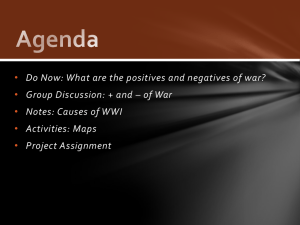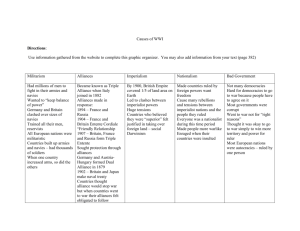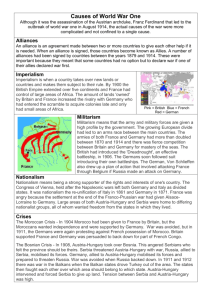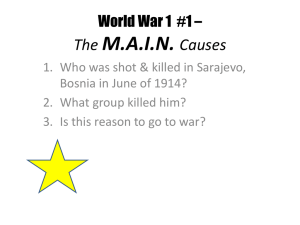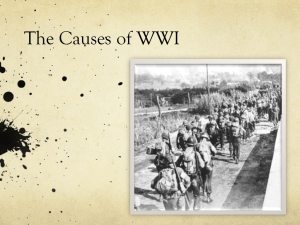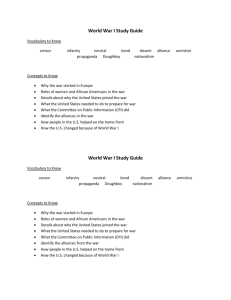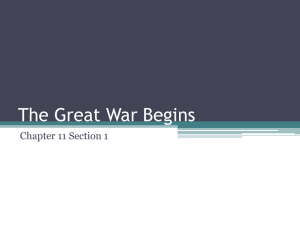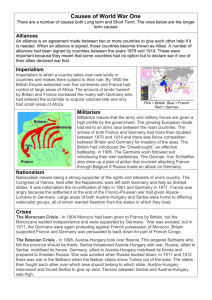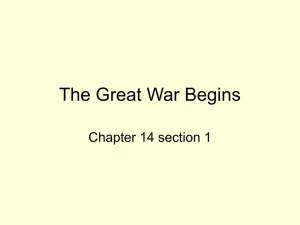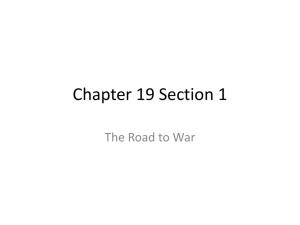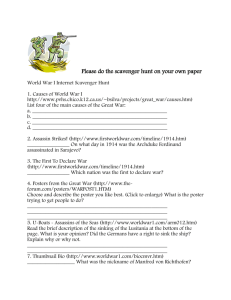Militarism
advertisement
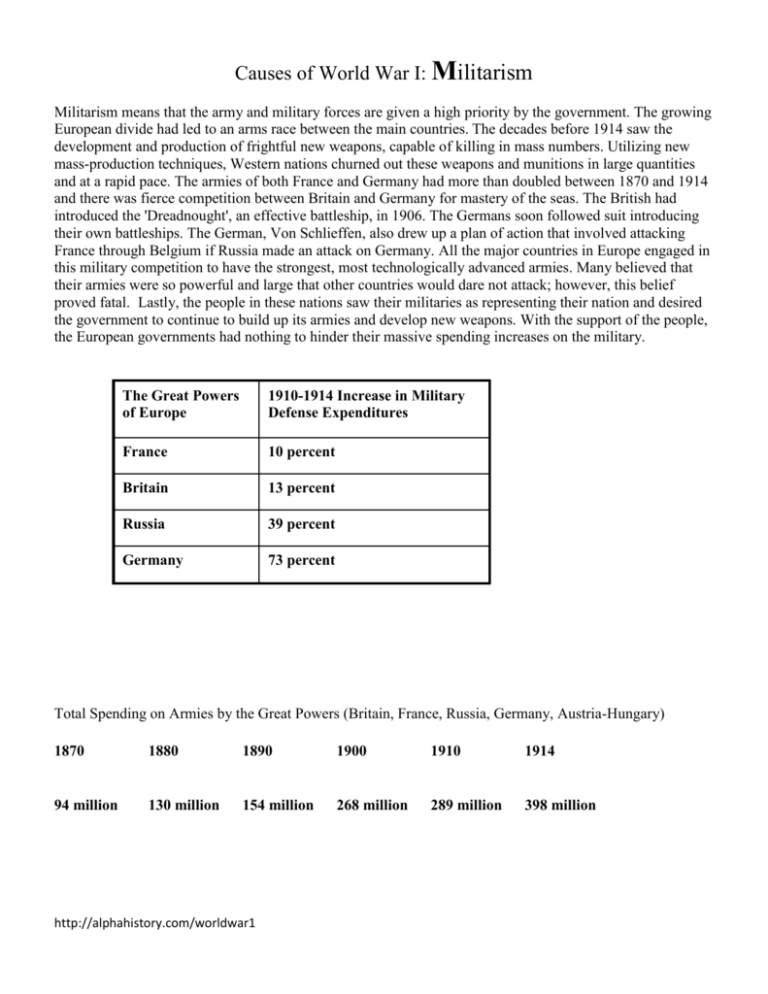
Causes of World War I: Militarism Militarism means that the army and military forces are given a high priority by the government. The growing European divide had led to an arms race between the main countries. The decades before 1914 saw the development and production of frightful new weapons, capable of killing in mass numbers. Utilizing new mass-production techniques, Western nations churned out these weapons and munitions in large quantities and at a rapid pace. The armies of both France and Germany had more than doubled between 1870 and 1914 and there was fierce competition between Britain and Germany for mastery of the seas. The British had introduced the 'Dreadnought', an effective battleship, in 1906. The Germans soon followed suit introducing their own battleships. The German, Von Schlieffen, also drew up a plan of action that involved attacking France through Belgium if Russia made an attack on Germany. All the major countries in Europe engaged in this military competition to have the strongest, most technologically advanced armies. Many believed that their armies were so powerful and large that other countries would dare not attack; however, this belief proved fatal. Lastly, the people in these nations saw their militaries as representing their nation and desired the government to continue to build up its armies and develop new weapons. With the support of the people, the European governments had nothing to hinder their massive spending increases on the military. The Great Powers of Europe 1910-1914 Increase in Military Defense Expenditures France 10 percent Britain 13 percent Russia 39 percent Germany 73 percent Total Spending on Armies by the Great Powers (Britain, France, Russia, Germany, Austria-Hungary) 1870 1880 1890 1900 1910 1914 94 million 130 million 154 million 268 million 289 million 398 million http://alphahistory.com/worldwar1 Causes of World War I: Alliances An alliance is a formal political, military or economic agreement signed by two or more nations. Alliances are binding under international law, though they are frequently annulled or broken. Basically, an alliance is an agreement made between two or more countries to give each other help if it is needed. When an alliance is signed, those countries become known as Allies. In most cases these alliances and ententes were formulated in secret, behind closed doors; they were only revealed to the public later. Some nations even entered into negotiations without consulting their other alliance partners. A number of alliances had been signed by countries between the years 1879 and 1914. These were important because they meant that some countries had no option but to declare war if one of their allies declared war first. There had always been competition and rivalries between countries in Europe, so they entered into alliances for protection against other nations (enemies) and to maintain the peace. Many wonder why alliances would keep the peace and avoid war – the mindset of the day was that countries would not attack other countries that had allies because that meant going to war with more than one country; however, this belief proved disastrous. The Triple Alliance (1882). A complex three-way alliance between Germany, Austria-Hungary, and Italy. (Italy will eventually leave it before WWI and be replaced by the Ottoman Empire) The Triple Entente (1907). An alliance between Russia, France, and Britain to counter the increasing threat from Germany. Alliances Web (below). The web of alliances created a possible “domino effect” where if one country goes to war their alliances could drag all the others into war as well. http://alphahistory.com/worldwar1 Causes of World War I: Nationalism Nationalism means being a strong supporter of the rights and interests of one's country. It was nationalism that led to the re-unification and creation of Italy in 1861 and Germany in 1871 in which they became countries. This also served to tip the balance of power away from France and toward Germany. Every one of Europe’s Great Powers developed a firm but excessive belief in its own cultural, economic and military supremacy. This over-confidence gave birth to a fatal misconception: that in the event of war in Europe, one’s own country would be victorious in few months. This arrogance was fuelled by the press in every country. Looking at the decades before World War I, the European countries had engaged in Imperialism where they took over various areas of the world such as Africa, India, China, and Southeast Asia. Imperialism helped fuel nationalism and the belief that the European countries were better than others. The pages of newspapers were often packed with stories and editorials filled with nationalist rhetoric. Heightened nationalism could also be found in other cultural expressions, like literature, music and theatre. European populations became convinced of two things: that their nations and governments were right and that their military would win any conflict. As these attitudes hardened, the likelihood of war increased. With the exception of France, beaten by the Prussians (Germans) in 1871, no major European nation had tasted military defeat for more than half a century; thus, many of them had forgotten how horrible war was. The arms race and the development of new military technology furthered this mood of invincibility. Nationalism Political Cartoon http://alphahistory.com/worldwar1 Causes of World War I: Imperialism Imperialism is the practice of maintaining an empire, or a collection of colonies. An imperialist nation – sometimes benignly called the ‘mother country’ – acquires new territories through exploration or military conquest. Once imperial control was established, the primary purpose of a colony was to benefit the mother country. Usually this involved the supply of precious metals, other raw materials, cheap labor or agricultural land. Britain’s empire was largely based on trade, particularly the importation of raw materials and the commercial sale of manufactured goods. A colony might also offer military advantages, such as a strategic location for naval bases or troops. By 1914 when WWI was starting, imperial conquest had almost run its course: there were relatively few parts of the world still available for colonization. The amount of lands 'owned' by Britain and France increased the rivalry with Germany who had entered the scramble to acquire colonies late and only had small areas of Africa. Competition and a desire to obtain more resources than other nations was one of the main underlying factors in pushing the European countries to war. The British Empire took in India, South Africa, Australia, New Zealand, Canada, Hong Kong, parts of north Africa, islands in the Pacific and Caribbean and concessions in China. France was the imperial power in modern-day Vietnam, Laos and Cambodia, areas of West Africa and India, small colonies in South America, islands in the Pacific and Caribbean. Germany had seized control of modern-day Tanzania, Namibia and the Cameroon in Africa, German New Guinea and concessions in China. America was a relative newcomer to imperialism, but nevertheless controlled the Philippines, Guam, American Samoa and Puerto Rico. http://alphahistory.com/worldwar1 Causes of World War I: Assassination The Balkans is an area in southeast Europe where tensions have been rising since the late 1800s. In 1908, Austria-Hungary took over the nation of Bosnia which was located in the Balkans. This angered Serbians who felt the province should be theirs. Serbia was an ally of Russia, while Austria-Hungary was an ally of Germany. In June 1914, Franz Ferdinand (the heir to the Austrian-Hungarian Empire) decided to visit Sarajevo, the capital of Bosnia, to make an inspection of the Austro-Hungarian troops there. It was planned that Franz Ferdinand and his wife Sophie would be met at the station and taken by car to the City Hall where they would have lunch before going to inspect the troops. A Serbian terrorist group, called The Black Hand, had decided that the Archduke should be assassinated and the planned visit provided the ideal opportunity. Gavrilo Princip, stepped forward and fired two shots at the couple while they were being driven through the streets. The first hit the pregnant Sophia in the stomach, she died almost instantly. The second shot hit the Archduke in the neck. He died a short while later. The immediate response of the Austro-Hungarian regime was to demand an inquiry into the assassination and those involved, to be conducted on Serbian soil by Austrian authorities. But the Serbian government rejected this, declaring that Serbian officials had no involvement whatsoever in the killings and that “the matter did not concern the Serbian government”. Serbia turned to Russia for help and Austria-Hungary called for German support. The Russian government called for a mobilization of its forces (not a declaration of war); however, the Germans saw the action as aggressive and declare war. In a matter of days, the Great Powers of Europe were at war with one another as their alliances dragged them into the conflict. Russian Empire Britain Germany France http://alphahistory.com/worldwar1 AustriaHungary The Assassination
